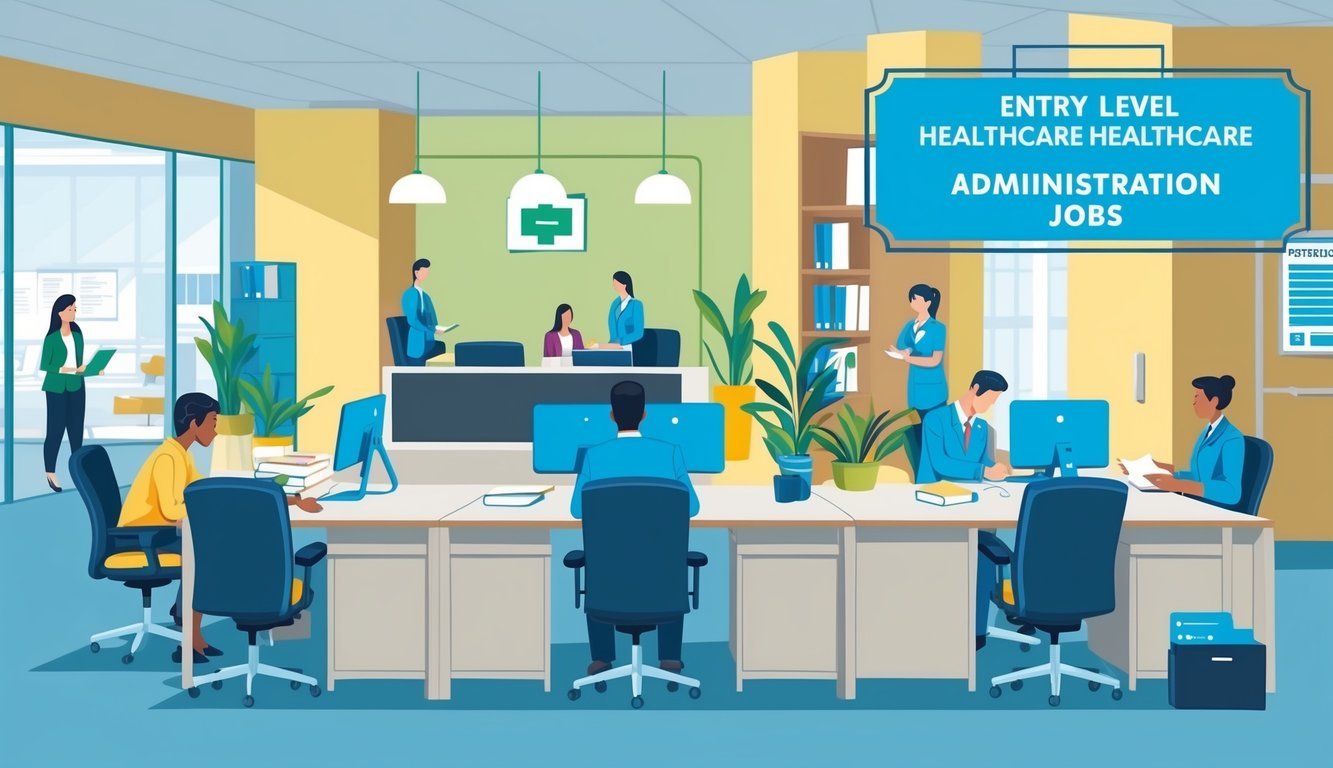Entry level healthcare administration jobs offer a great start for those interested in the healthcare field. These positions not only provide valuable experience but also allow you to impact patient care and streamline operations within healthcare organizations. As the demand for efficient healthcare systems continues to grow, the need for skilled administrators becomes crucial to delivering quality services.
In this article, you will explore various pathways to enter the healthcare administration field, including educational requirements and key skills needed to succeed.
Additionally, you will find insights into job profiles, career advancement opportunities, and tips for creating a positive workplace environment.
Understanding these aspects can help you position yourself effectively in the job market.
Key Takeaways
- Entry-level positions can lead to significant career growth in healthcare administration.
- Key skills include communication, organization, and problem-solving.
- Educational backgrounds can vary, but relevant degrees enhance job prospects.
Educational Pathways

To pursue entry-level healthcare administration jobs, you typically need a solid educational background.
This includes obtaining a relevant degree and possibly acquiring certifications.
Both elements are crucial for building a successful career in this field.
Bachelor’s Degree in Healthcare Administration
A bachelor’s degree in healthcare administration is often the foundational step toward entering this field.
This degree usually covers essential topics like healthcare systems, business principles, and management strategies.
Many programs include coursework in:
- Healthcare Finance
- Healthcare Law and Ethics
- Human Resources Management
These subjects prepare you for various roles in healthcare settings.
You might work in hospitals, clinics, or nursing homes, where administration skills are essential.
In larger organizations, having a Bachelor’s in Business Administration with a focus on healthcare can also be beneficial.
This path provides broader business knowledge that enhances your ability to manage healthcare operations effectively.
Certifications and Licenses
While a degree is important, obtaining additional certifications can boost your employability.
Certifications show your commitment and expertise in specialized areas like compliance or healthcare management.
For example, becoming a Licensed Nursing Home Administrator (LNHA) requires passing exams and meeting state-specific requirements.
This license is crucial if you aspire to oversee nursing facilities.
Other helpful certifications include:
- Certified Healthcare Administrator (CHA)
- Certified Medical Manager (CMM)
These can enhance your resume and prove your proficiency in the field.
You can often find relevant programs and resources through professional organizations, such as the American College of Healthcare Executives.
Pursuing these credentials will make you a more competitive candidate in the healthcare job market.
Key Skills for Healthcare Administrators

As a healthcare administrator, specific skills are crucial for effectively managing the complexities of healthcare settings.
These skills will help you navigate daily responsibilities and ensure quality patient care while adhering to regulations.
Technical Proficiency
In today’s healthcare environment, technical proficiency is essential.
Familiarity with software like Microsoft Excel, Word, and Outlook is critical for financial management and project management tasks.
You may also need to work with specialized systems like Epic for electronic health records.
Understanding data analysis tools helps in quality improvement initiatives and in tracking key performance indicators (KPIs).
Being comfortable with technology allows you to streamline operations, assist in billing and coding for Medicare and Medicaid, and enhance overall efficiency.
Leadership and Management Skills
Strong leadership and management skills are vital for success in healthcare administration.
You will oversee teams, manage projects, and ensure that staff are motivated.
Your ability to communicate effectively boosts interpersonal skills and fosters a collaborative environment.
You will also need problem-solving abilities to address challenges and improve healthcare delivery.
Skills in financial management and compliance are essential as you guide your team in adhering to policies and procedures, including those related to quality improvement.
Understanding Healthcare Compliance
Healthcare compliance is a critical area you must understand.
Familiarity with local, state, and federal regulations ensures that your organization meets standards related to patient privacy and care quality.
You need to navigate complex compliance issues involving Medicare and Medicaid.
This knowledge helps protect your organization from legal risks and financial penalties.
Incorporating compliance training for your team can minimize errors and enhance patient safety.
Understanding these regulations positions you as an effective advocate for quality care in your organization.
Entry-Level Job Profiles
Entry-level healthcare administration jobs offer various roles that are essential for the smooth operation of medical facilities.
Each position plays a part in ensuring patients receive quality care and that administrative tasks run efficiently.
Administrative Roles
In administrative roles, you may work as an office administrator, medical receptionist, or admissions coordinator.
These positions focus on managing patient schedules and ensuring smooth office operations.
Common tasks include:
- Patient Scheduling: Organizing appointments to maximize staff and resources.
- Insurance Billing: Handling claims and verifying patient insurance information.
- Documentation: Keeping accurate patient records and maintaining compliance with regulations.
These roles are critical for efficient practice management, especially in a busy physician office.
You can gain valuable skills related to office management and patient interaction.
Clinical Support Positions
As you enter clinical support positions, you might encounter roles such as a research coordinator or an entry-level coding specialist.
These positions are vital for supporting medical staff and ensuring that patient data is effectively managed.
Key responsibilities may include:
- Clinical Research: Assisting in gathering and analyzing patient information for research purposes.
- Patient Interaction: Engaging with patients to collect important health information.
- Data Entry: Accurately entering patient data into medical records and databases.
These roles strengthen your understanding of clinical processes and improve your organizational skills.
Starting in Long-Term Care Facilities
If you start your career in long-term care facilities, you could work as a nursing home administrator or assist with resident care plans.
These positions focus on managing the needs of patients who require ongoing care due to health conditions.
Primary duties might include:
- Compliance with Long-Term Care Regulations: Ensuring that the facility meets health and safety standards.
- Coordination of Care Plans: Collaborating with healthcare providers to develop strategies for patient care.
- Staff Management: Supporting the hiring and training of staff to deliver high-quality care.
These roles are crucial for maintaining the well-being of residents and complying with regulatory requirements.
Career Advancement Opportunities
In healthcare administration, you can enhance your career through various paths.
Two significant opportunities are transitioning into management roles and specializing in specific healthcare services.
Transitioning to Management
Moving into a management position is a common next step.
As you gain experience in entry-level roles, focus on developing organizational skills and understanding the financial performance of the facility.
These skills are crucial for roles like a management trainee or practice administrator.
Many healthcare facilities value employees who can improve quality of care while increasing efficiency.
Pursuing certifications, such as those from the American College of Healthcare Executives, can enhance your qualifications.
Networking within your organization and seeking mentorship from established managers can also provide valuable insights and guidance.
Specialization in Healthcare Services
Specializing can set you apart in the competitive healthcare field.
Areas of specialization may include clinical trials, process improvement, or even volunteer services.
Each of these areas allows you to play a vital role in enhancing healthcare delivery.
For instance, focusing on healthcare standards can lead to roles that ensure compliance with regulations and improve patient outcomes.
By developing expertise in a specific area, you can increase your employability and open doors to advanced positions within your organization.
Consider pursuing further education or certifications in your chosen specialty to enhance your knowledge and skills.
Creating a Positive Workplace

A positive workplace in healthcare administration is essential for enhancing the experience of both staff and patients.
Prioritizing respect and effective communication fosters a healthy environment.
Holistic patient care further ensures that every individual receives comprehensive support.
Fostering a Culture of Respect
Creating a culture of respect is critical for healthcare professionals.
Start by encouraging open communication among staff.
This can be achieved through regular team meetings and feedback sessions.
Key strategies to foster respect:
- Active Listening: Ensure that every team member feels heard during discussions.
- Recognition: Celebrate achievements, both big and small, to boost morale.
- Diversity Training: Implement training sessions that address cultural awareness and inclusion.
By promoting these practices, you help build a positive environment where all employees feel valued.
This can lead to improved teamwork and quality service for patients.
Ensuring Holistic Patient Care
Holistic patient care is vital for improving resident experience.
It means treating the patient as a whole, considering their physical, emotional, and social needs.
You should collaborate closely with rehabilitation teams and other healthcare professionals to achieve this.
Steps to ensure holistic care include:
- Thorough Assessments: Conduct detailed evaluations that cover various aspects of health.
- Personalized Care Plans: Develop tailored care plans that address individual patient needs.
- Collaborative Communication: Use effective communication skills to share information among team members.
By focusing on these areas, you enhance the quality of care provided and ensure a better overall experience for residents.
Frequently Asked Questions

This section addresses common queries related to entry-level healthcare administration jobs.
You will find information regarding salary ranges, qualifications, remote opportunities, and career growth to help you better understand this field.
What are typical salary ranges for entry level healthcare administration jobs?
Entry-level salaries for healthcare administration positions can vary based on location and specific roles.
Generally, you can expect salaries to range from $30,000 to $50,000 annually.
In some states like New Jersey, entry-level positions may offer higher salaries, sometimes exceeding $74,000.
What qualifications are required for entry level healthcare administration positions?
Most entry-level healthcare administration jobs require at least a high school diploma or equivalent.
Many roles prefer candidates with an associate or bachelor’s degree in healthcare administration or a related field.
Certifications, such as those from the American Health Information Management Association (AHIMA), can also enhance your qualifications.
How can I find entry level healthcare administration jobs that offer remote work opportunities?
To find remote entry-level healthcare administration jobs, you can use job search websites like Indeed and LinkedIn.
Filter your search for remote positions specifically.
Many healthcare organizations are increasingly offering flexible work options, so check company career pages for potential openings.
What career growth prospects exist for individuals starting in entry level healthcare administration roles?
Starting in an entry-level position can lead to advanced roles in healthcare administration.
With experience and additional education, you can move into management roles such as Medical and Health Services Manager.
Continuing education and networking can further enhance your career prospects.
What are the daily responsibilities of an entry level healthcare administration job?
Daily responsibilities can include managing patient records, scheduling appointments, and coordinating communication between staff and patients.
You may also handle billing, assist with compliance tasks, and ensure that office operations run smoothly.
How can someone with no experience get started in a healthcare administration career?
To get started with no experience, consider applying for internships or volunteer positions in healthcare settings.
Pursuing relevant education, such as an associate degree or certificate program, can also help.
Networking and informational interviews with industry professionals can provide valuable insights and job leads.

